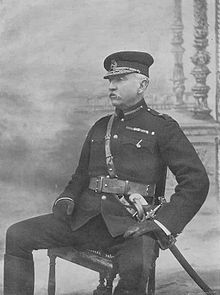Thomas Kelly-Kenny
| Sir Thomas Kelly-Kenny | |
|---|---|

General Sir Thomas Kelly-Kenny
|
|
| Born | 27 February 1840 Kilrush, county Clare, Ireland |
| Died |
26 December 1914 (aged 74) Hove, Sussex, England |
| Allegiance |
|
| Service/branch |
|
| Rank | General |
| Commands held | 6th Division |
| Battles/wars | Second Boer War |
| Awards |
Knight Grand Cross of the Order of the Bath Knight Grand Cross of the Order of St Michael and St George |
General Sir Thomas Kelly-Kenny, GCB, GCVO (27 February 1840 – 26 December 1914) was a British Army general who served in the Second Boer War.
Thomas Kelly was born on 27 February 1840 in Kilrush,County Clare, Ireland. He was educated as a lay student at St. Patrick's College, Carlow and at Sandhurst. He was the fifth son of Matthew Kelly and Mary Kenny He assumed in 1874 the additional name of Kenny, under the will of his maternal uncle, Dr. Mathias Kenny, a survivor of the Peninsular War and the Battle of Waterloo. He was appointed Ensign without purchase in the 1st Battalion, 2nd (The Queen's Royal) Regiment of Foot on 2 February 1858 and was appointed to command the escort of General Sir James Jackson General Officer Commanding Cape of Good Hope. When this officer was succeeded by General Wynward he was appointed ADC. He resigned this post on the outbreak of war with China in 1860 and accompanied his regiment to the Far East where he was appointed ADC to the Commander of the Queen's, Sir Alfred Jephson. He held this post for the duration of the war. He was further appointed Lieutenant by purchase on 12 October 1860, the day Pekin surrendered to the Allies and engaged in the China war at Sinho and at the taking of Tanku and Taku forts. He was mentioned in despatches and was decorated. He was appointed Captain by purchase on 20 July 1866. He was (acting) Deputy Assistant Quartermaster General (QMG) in Bombay from 25 May 1869 to April 1870 when he was sent to Abyssinia on the outbreak of war. He was in charge of the transport train at the front and was mentioned by Lord Napier in despatches for "zeal, energy and ability". In 1875 he graduated at the staff training college and received a medal in 1877.
...
Wikipedia
